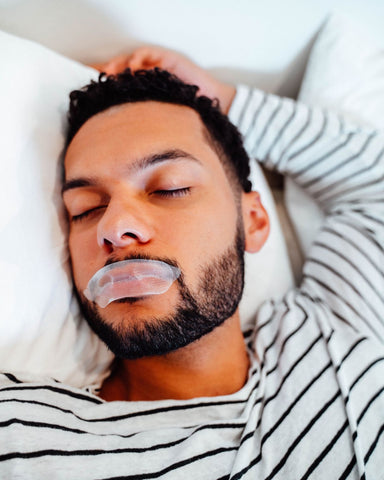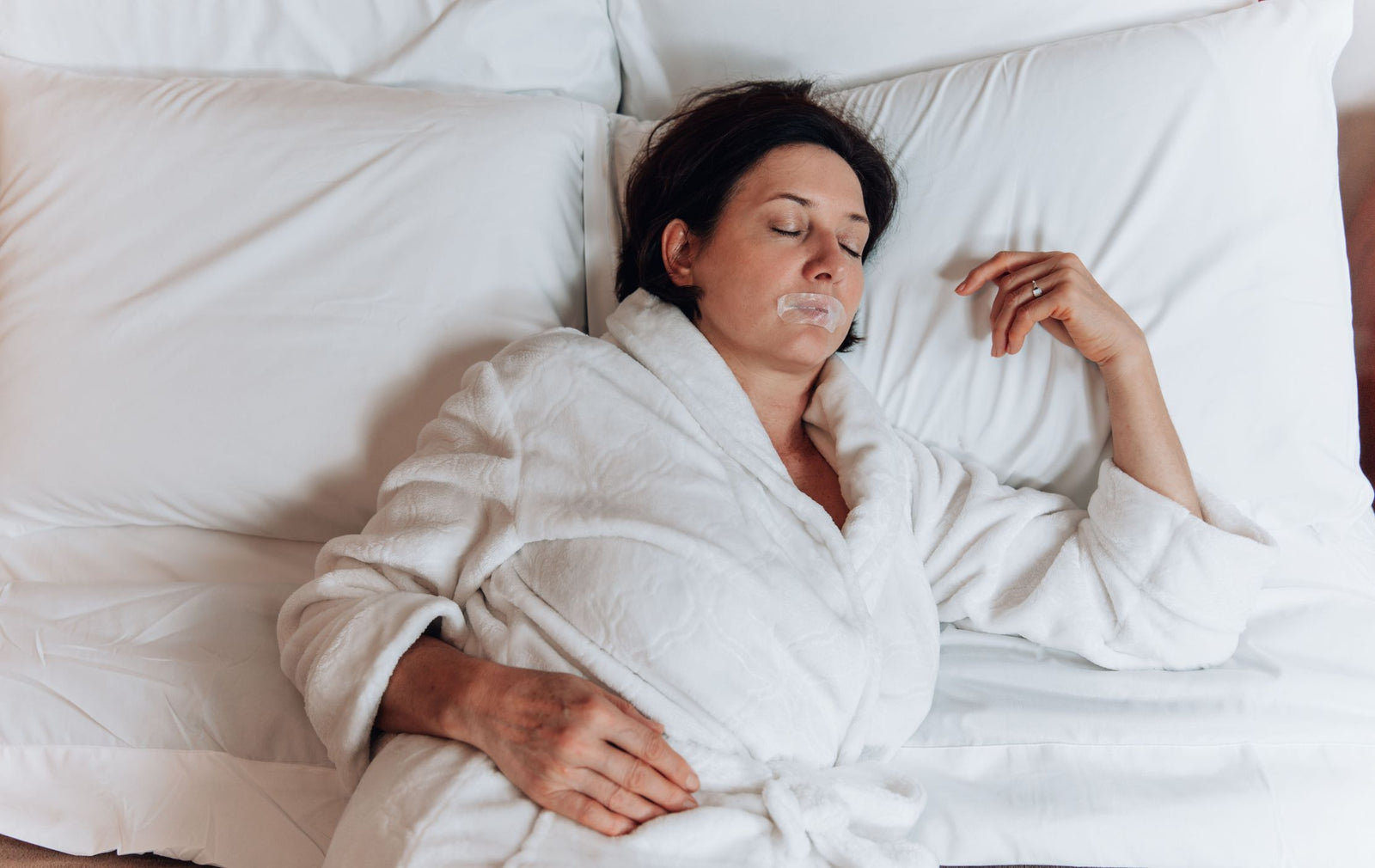We hear about interesting tips and compelling tricks to help us sleep at night all of the time (and some of them are more out there than others!)
Some people swear by taking a melatonin supplement, a hot bath, or even doing a headstand before bed for improved sleep.
However, we don’t spend as much time talking about things toavoid at night to ensure a quality night’s rest.
You might be completing every recommended “tip,” yet you still find yourself staring into the dark while calculating how many hours of shut-eye you would get if you could just fall asleep within the next ten minutes.

For instance, do you pay attention to the time of day that you exercise? Have you ever asked yourself, “is it bad to workout before bed?” The answer is yes if you’re pushing it too hard!
Turn your attention toward avoiding these seven things at night for your best sleep yet, starting with avoiding harsh LED lighting after dark.
1. Blue Light and Electronic Use
Technology is weaved into almost every part of our lives. We use computers, laptops, cell phones, tablets, and more every single day.
Just about every electronic device out there, including your television, emits something called blue light.
Light exists in different forms and wavelengths. Red light, like light from a candle, has longer wavelengths, while blue light has shorter wavelengths.
When wavelengths from blue light hit the retinas in your eyes, the production of melatonin slows down. Since melatonin is a sleep hormone, this not only makes it harder to fall asleep; it makes you more tired than usual in the morning.

In fact, Harvard researchers found that blue light suppresses melatonin for about twice as long as other wavelengths, like green light, shifting your sleep schedule by as much as three hours!
If you fall asleep while watching television, try reading or meditating instead. If you can’t escape the grip of blue light in the evening, opt for blue-light-blocking glasses.
Moreover, if you have an iPhone, turn on a setting called the “Night Shift” mode, which warms up the temperature of your screen and allegedly filters out blue light.
To turn this feature on, head to Settings > Display & Brightness. From there, you can toggle this setting off or on and set a scheduled time for your display to automatically switch over each day.


Once you’ve enabled this setting, you might feel more inclined to get on your phone closer to bedtime, but don’t use this as an excuse to stay up perusing your email inbox.
2. Checking Your Inbox
More and more of us are working from home than ever before, blurring the lines between personal time and work time.
We know how tempting email notifications can be, but that doesn’t mean you should open each new email that comes in during the evening.
No matter how curious you are about the contents of the message, checking it close to bedtime activates your stress responses rather than helping you wind down.

You don’t want to create more unfinished tasks within your mind close to bed. Instead, you want to focus on activities that lower stress levels, blood pressure, and improve wellbeing.
Turn off your email notifications and opt for breathwork, a good book, or even some bedtime yoga. Your inbox will still be there in the morning!
If you do opt for some yoga, don’t overdo it. Here’s why!
3. Intense Workouts
You might be thinking, “Wait, is it bad to workout before bed? I thought working out wasgood for my health?”
Exercise is proven to help us both mentally and physically. Moving your body is known to calm anxiety, decrease depression, and even provoke body temperature cooling that we need to relax at night.
In reality, science backs the idea that exercise improves sleep quality and helps us drift off faster in comparison to the days we go without exercise.
Over time, exercise can even boost the time we spend in restorative slow-wave sleep!

That said, it can be counterproductive to work out before bed if it’s too close to bedtime or too intense of a workout.
After a workout, your core temperature rises. Over time, you slowly cool off, inducing sleep.
When you push it too hard too close to rest time, your core body temperature won’t have enough time to cool all the way off, keeping you awake.
If you work out at night, try moving to a morning workout or avoiding exercise at least four hours before your regular bedtime.
Nutrition is key, especially after moving your body. But huge late-night meals don’t allow your digestive system to take the break it needs.
4. Huge Late-Night Meals
Although you still digest food as you rest, the digestive system reaches its lowest level of function during sleep.
It makes sense: your stomach wants to rest while you do! However, late-night eating puts an unnecessary strain on the digestive system, especially in large quantities.
Conversely, a small amount of the right foods before bed can help you sleep. Foods containing tryptophan (like cheese or turkey) are known to help you drift off easier.

Tryptophan is an essential amino acid that helps the body create serotonin, a neurotransmitter that helps to regulate sleep and is the precursor to melatonin.
If you plan to eat a large meal, opt to eat within four or five hours before bedtime. If you feel hungry before bed, snack on a small amount of food that promotes quality rest.
Moreover, to avoid trips to the bathroom or disrupted rest, you shouldn’t drink alcohol or caffeine close at night.
5. Drinking Alcohol or Caffeine
If you enjoy the occasional glass of wine, you’re probably well aware that it helps you drift off to sleep easier.
Before you pour yourself a hefty glass, beware. Research shows that it makes it harder than usual to stay asleep throughout the night.
As your body begins to break down and metabolize alcohol during the second half of sleep, rapid eye movement (REM) sleep is disrupted.
This sleep phase is vital for improving memory, boosting concentration, and “cleaning” out the brain. Since drinking suppresses this phase, you’ll wake up more often throughout the night and feel groggy the next day.

The same can be said for caffeine. If you like a nice cup of tea before bed, try one low in caffeine, as it boosts adrenaline levels, keeping you awake and revved up.
Chocolate has hidden caffeine, too, so before you down a cup of hot chocolate or nibble on your favorite decadent treat, check the caffeine content!
Cut off your alcohol and caffeine consumption several hours before bed to avoid sleep disruptions caused by your favorite indulgent treats.
Use the time you normally spend drinking wine, downing a cup of tea, or nibbling on chocolate to focus on your breathing instead.
Specifically, you should ask yourself if you’re breathing through your nose or your mouth.
6. Mouth Breathing
Mouth breathing sounds harmless, right?
Wrong! It places your body into overdrive, activates all of your fight or flight reflexes, and disrupts your airway health.
It even causes snoring since it forces the tissues in the airway to collapse backward, causing everything to vibrate together. This produces the dreaded sound of logs being sawed, AKA, snoring!
Nasal breathing, on the other hand, activates our parasympathetic response, helping us to rest, digest, and fully relax.
In fact, we were intended to nasal breathe! The mouth was made for eating and talking, while the nose is for smelling and breathing.
@somnifix You probably dont think twice about your breath. 😮💨 Heres why you should! #nasalbreathing #airwayhealth #patrickmckeown #didyouknow #learnontiktok ♬ Glimpse of Us - Joji
The nose warms, filters, and humidifies the air we breathe, keeping harmful pathogens that cause illness from reaching our lungs.
Moreover, the nose produces nitric oxide, a miracle molecule known to improve health.
You can train yourself to switch over to nasal breathing during the day with nasal breathing exercises and by decongesting your nose.
But wait, how can you ensure that you nasal breathe into the night? Tape your mouth shut!
7. Failing to Use SomniFix Strips
We’ve already learned so much about what to avoid at night for better sleep.
We’ve uncovered if it’s harmful to use your phone at night and if it’s bad to workout before bed. But why is it a mistake to forego mouth tape as you rest?
It may sound like a silly gimmick, but there are entire organizations and books dedicated to educating the public about airway health, mouth taping, and nasal breathing.
Mouth tape is a surefire tool to stop snoring at night and ensure you nasal breathe for improved sleep.

All you have to do is place a strip over your lips and drift off to sleep; your body will take care of the rest.
This handy trick prevents dry mouth, grogginess, fragmented sleep, and more, but just any tape won’t do.
SomniFix Mouth Strips are the most comfortable tape on the market, specifically designed for your lips and skin. Our gel-like adhesive is so comfortable that you’ll forget you’re even wearing mouth tape.
Our adhesive is also free of latex and gluten, meaning that they’re the best mouth tape option for any skin type.

SomniFix Strips even feature a vent in the center that allows for mouth breathing in emergency scenarios, like overnight congestion.
Avoid another sleepless, snore-filled night by adding SomniFix to your bedtime routine!



